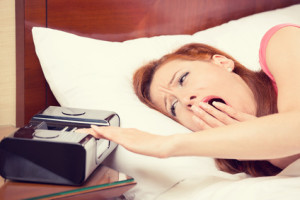Sleep is an important part of our overall health and well-being. Without enough sleep we can be grumpy and irritable, find it hard to concentrate during the day, and will often suffer with other health issues such as headaches, back pain as well as increasing the risk of obesity, heart disease and diabetes.
 We spend up to one-third of our lives asleep. Sounds like a lot doesn’t it! But in reality some of us are not getting anywhere near enough sleep. One in three Britons suffer with poor sleep, with stress, computers and taking work home often blamed for the lack of quality sleep.(1) If you’ve experienced sleep problems at any time in your life, then you’ll know there’s nothing worse than not having a decent night’s sleep.
We spend up to one-third of our lives asleep. Sounds like a lot doesn’t it! But in reality some of us are not getting anywhere near enough sleep. One in three Britons suffer with poor sleep, with stress, computers and taking work home often blamed for the lack of quality sleep.(1) If you’ve experienced sleep problems at any time in your life, then you’ll know there’s nothing worse than not having a decent night’s sleep.
So how much sleep do we actually need? The National Sleep Foundation have put together a chart which shows how much sleep is the right amount of sleep dependent on your age. The chart shows both the recommended number of hours sleep according to age, and the hours that may be appropriate. And yes, the average optimum number of hours we should spend asleep is eight.
Therefore, what can we do to ensure we are getting those vital eight hours each night, and at the same time limit any negative mental or physical side effects of sleep deprivation? Perhaps the most obvious answer is to get more sleep. However, in order to sleep more, you may have to make some changes and give it time. Your sleep patterns are unlikely to change immediately.
Here are our top 5 tips:
- Factor some exercise into your routine – 30 minutes at least three days a week is recommended.(2)
- Avoid caffeine in the evening. Caffeine is a stimulant and drinking coffee, tea and some fizzy drinks close to bedtime may make it harder to fall asleep.(2)
- Try not to go to bed on a full stomach. Feeling full when lying down may make it harder to fall asleep.(2)
- Get into a routine. Try to go to bed the same time each evening and wake up at the same time each morning. This will help to regulate your biological clock.(2)
- Create a good sleeping environment. Make sure mobile devices and tablets are kept out of the bedroom, make sure the room is cool and dark and choose a supportive mattress.(2)
The quality of our bed is one of the key factors in getting a good night’s sleep. A study undertaken in 2008 by Jacobson, Boolani and Smith, looked at the changes in back pain, sleep quality and perceived stress after the introduction of new bedding systems.(3) The study compared sleep quality and stress-related symptoms looking at beds over 5 years old compared with new bedding systems. Fifty-nine healthy men and women were recruited onto the study with minor musculoskeletal sleep-related pain and compromised sleep. The study examined back discomfort and sleep quality for 28 days as participants woke up in the morning in their own beds (with the average bed being 9.5 years old) and then for a further 28 days with participants sleeping on a new bedding system.
The study concluded that the new bedding systems increased sleep quality and reduced back discomfort, factors that may also be linked to stress-related symptoms.
So is it time to change your bed? According to the Sleep Council, if you wake up with aches and pains which disappear during the day and you are not sleeping as well as you did a year ago, or your mattress is showing signs of wear, it is probably time to change your bed.
There are a large number of bed choices from a wide range of manufacturers. The Sleep Council recommends you look for a supportive bed. You may want to consider memory foam, pocket sprung or orthopaedic, as well as considering the size of the bed you need. If you are suffering with neck and back pain, you may need an orthopaedic mattress. Companies such as Bedsos have a wide range of orthopaedic mattresses. An orthopaedic mattress is designed specifically to combat problems associated with back and joint problems, and offer tailored overall body support. Orthopaedic beds can come with either traditional sprung or memory foam mattresses.
(1) http://www.nhs.uk/Livewell/tiredness-and-fatigue/Pages/lack-of-sleep-health-risks.aspx
(2) http://www.sleepcouncil.org.uk/how-to-sleep/sleep-tips-for-the-over-50s/
(3) http://www.ncbi.nlm.nih.gov/pmc/articles/PMC2697581/


“Early to bed and early to rise”
on March 30, 2015 at 9:06 pm Khandakarthis could be a good exercise.
Unfortunately way too many people feel they have to have mobile devices in their bedroom which is proven to be detrimental to sleep. How many children actually get the correct amount of sleep as they struggle to switch their technology off at night?
on April 5, 2017 at 11:20 am talkhealth